Scientists researching type of coronavirus in Uganda

Testing. A medical personel takes a sample from one of the street children in Kampala on May 1, 2020 . PHOTO ABUBAKER LUBOWA.
What you need to know:
- More than half of the patients who tested positive did not have known symptoms for the disease like flue, cough and fever, as opposed to foreign countries where more than 80 per cent of patients present the symptoms.
The Uganda Virus Research Institute (UVRI) has said they are doing a deeper study on the type of Covid-19 affecting people in the country.
More than half of the patients who tested positive did not have known symptoms for the disease like flu, cough and fever, as opposed to foreign countries where more than 80 per cent of patients present the symptoms.
The death rate of the patients in other countries, specifically in Europe, is also high (two deaths per 100 cases).
Dr Julius Lutwama, the deputy Director of UVRI, said the coronavirus is changing at a worrying rate. He said there are already four variations of the coronavirus that have emerged in a very short time.
Dr Lutwama said the UVRI is sequencing the genome of the virus to study this detail.
The genome of an organism is the whole of its hereditary information encoded in its DNA. Sequencing the virus is the way scientists use to understand changes in the DNA of a virus.
“Coronavirus moved from one population to another such as from China to Europe, then from China to Africa, they have formed four different clades,” the virologist told Daily Monitor last week.
Dr Lutwama explained that the fast mutation will slow the development processes and may affect the efficacy of vaccines and drugs being developed against the virus.
“The vaccine being developed should be tested for efficacy in each of the clades (mutated types of SARS-CoV-2),” he said.
He said with these fast-changing viruses, booster doses of vaccine are often given to increase efficacy and better protect the population.
Dr Bruce Kirenga, the director of Makerere University Lung Institute, said the behavior of Covid-19 in Ugandan patients is very different.
He explained that the type of Covid-19 being treated in Uganda is different from that in other countries with mortality rates of as high as 19 deaths per 1,000 cases. That means two deaths in every 100 cases.
“The idea of this being a different phenotype of Covid-19 is very strong. This different phenotype holds a lot of answers on how we are going to respond to the epidemic,” he said.




